Significance of Staff Motivation Schemes in Improving Employee Productivity: A Study on Next plc
VerifiedAdded on 2023/06/07
|13
|2501
|98
AI Summary
This research aims to determine the significance of staff motivation schemes as one of the talent management strategies to improve and keep the productivity of employees. The research objectives include developing an understanding of staff motivation schemes and talent management in the retail industry, analyzing effective motivation schemes that can be applied within Next plc to improve and retain productivity of the workforce, and appraising the impact on the retention and productivity of talent by staff motivation scheme in Next Plc. The research methodology includes the use of surveys and secondary research. The research will be conducted ethically and in compliance with the Data Protection Act (1998).
Contribute Materials
Your contribution can guide someone’s learning journey. Share your
documents today.
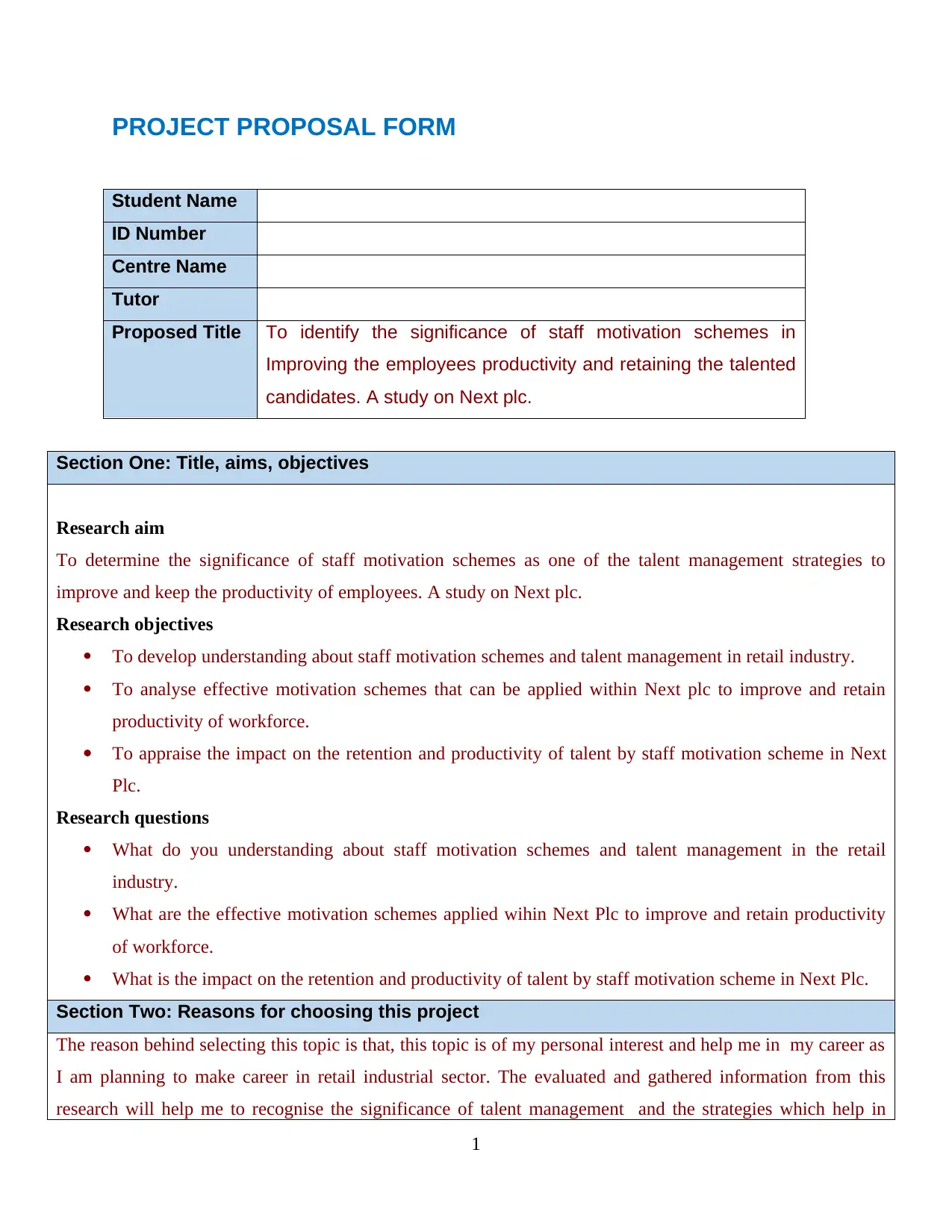
PROJECT PROPOSAL FORM
Student Name
ID Number
Centre Name
Tutor
Proposed Title To identify the significance of staff motivation schemes in
Improving the employees productivity and retaining the talented
candidates. A study on Next plc.
Section One: Title, aims, objectives
Research aim
To determine the significance of staff motivation schemes as one of the talent management strategies to
improve and keep the productivity of employees. A study on Next plc.
Research objectives
To develop understanding about staff motivation schemes and talent management in retail industry.
To analyse effective motivation schemes that can be applied within Next plc to improve and retain
productivity of workforce.
To appraise the impact on the retention and productivity of talent by staff motivation scheme in Next
Plc.
Research questions
What do you understanding about staff motivation schemes and talent management in the retail
industry.
What are the effective motivation schemes applied wihin Next Plc to improve and retain productivity
of workforce.
What is the impact on the retention and productivity of talent by staff motivation scheme in Next Plc.
Section Two: Reasons for choosing this project
The reason behind selecting this topic is that, this topic is of my personal interest and help me in my career as
I am planning to make career in retail industrial sector. The evaluated and gathered information from this
research will help me to recognise the significance of talent management and the strategies which help in
1
Student Name
ID Number
Centre Name
Tutor
Proposed Title To identify the significance of staff motivation schemes in
Improving the employees productivity and retaining the talented
candidates. A study on Next plc.
Section One: Title, aims, objectives
Research aim
To determine the significance of staff motivation schemes as one of the talent management strategies to
improve and keep the productivity of employees. A study on Next plc.
Research objectives
To develop understanding about staff motivation schemes and talent management in retail industry.
To analyse effective motivation schemes that can be applied within Next plc to improve and retain
productivity of workforce.
To appraise the impact on the retention and productivity of talent by staff motivation scheme in Next
Plc.
Research questions
What do you understanding about staff motivation schemes and talent management in the retail
industry.
What are the effective motivation schemes applied wihin Next Plc to improve and retain productivity
of workforce.
What is the impact on the retention and productivity of talent by staff motivation scheme in Next Plc.
Section Two: Reasons for choosing this project
The reason behind selecting this topic is that, this topic is of my personal interest and help me in my career as
I am planning to make career in retail industrial sector. The evaluated and gathered information from this
research will help me to recognise the significance of talent management and the strategies which help in
1
Secure Best Marks with AI Grader
Need help grading? Try our AI Grader for instant feedback on your assignments.
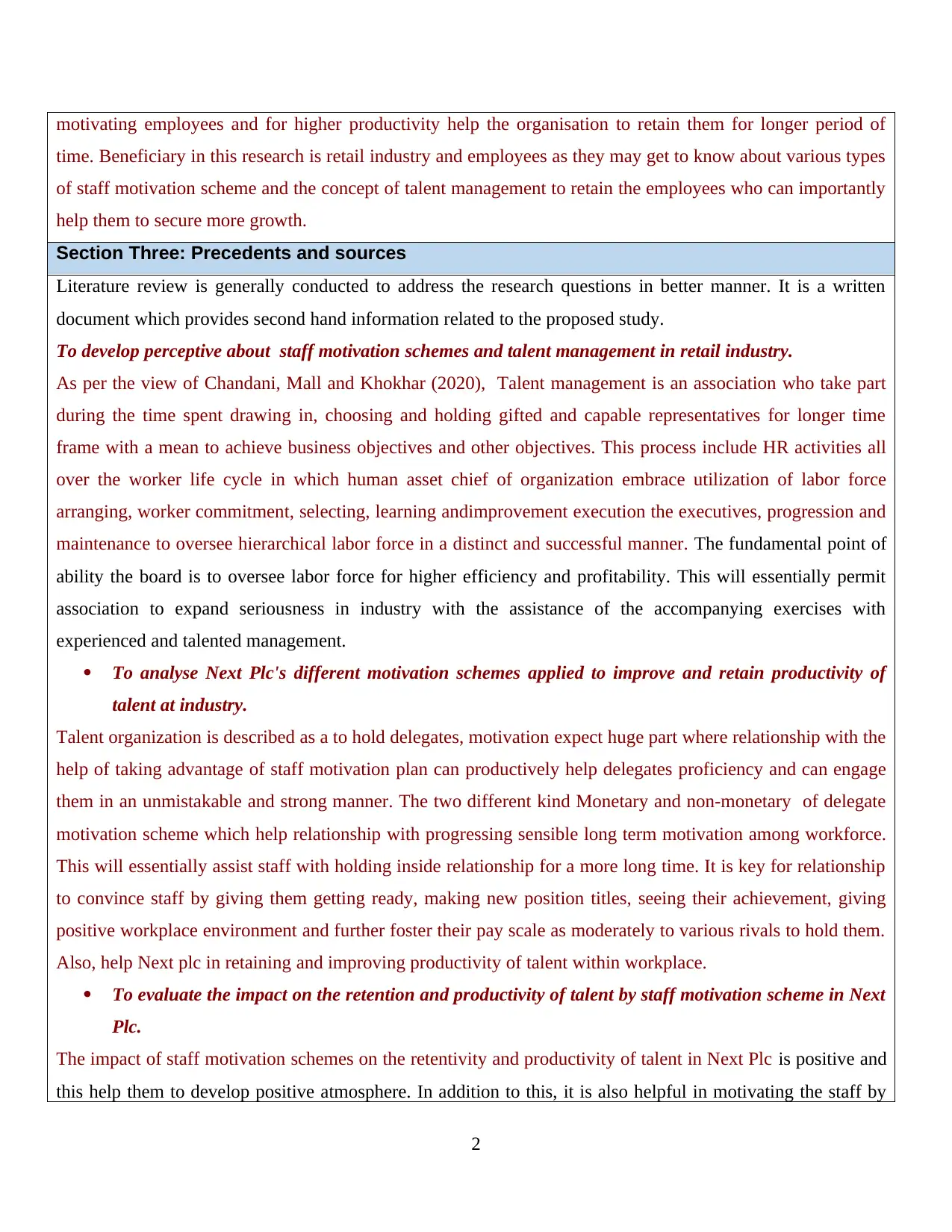
motivating employees and for higher productivity help the organisation to retain them for longer period of
time. Beneficiary in this research is retail industry and employees as they may get to know about various types
of staff motivation scheme and the concept of talent management to retain the employees who can importantly
help them to secure more growth.
Section Three: Precedents and sources
Literature review is generally conducted to address the research questions in better manner. It is a written
document which provides second hand information related to the proposed study.
To develop perceptive about staff motivation schemes and talent management in retail industry.
As per the view of Chandani, Mall and Khokhar (2020), Talent management is an association who take part
during the time spent drawing in, choosing and holding gifted and capable representatives for longer time
frame with a mean to achieve business objectives and other objectives. This process include HR activities all
over the worker life cycle in which human asset chief of organization embrace utilization of labor force
arranging, worker commitment, selecting, learning andimprovement execution the executives, progression and
maintenance to oversee hierarchical labor force in a distinct and successful manner. The fundamental point of
ability the board is to oversee labor force for higher efficiency and profitability. This will essentially permit
association to expand seriousness in industry with the assistance of the accompanying exercises with
experienced and talented management.
To analyse Next Plc's different motivation schemes applied to improve and retain productivity of
talent at industry.
Talent organization is described as a to hold delegates, motivation expect huge part where relationship with the
help of taking advantage of staff motivation plan can productively help delegates proficiency and can engage
them in an unmistakable and strong manner. The two different kind Monetary and non-monetary of delegate
motivation scheme which help relationship with progressing sensible long term motivation among workforce.
This will essentially assist staff with holding inside relationship for a more long time. It is key for relationship
to convince staff by giving them getting ready, making new position titles, seeing their achievement, giving
positive workplace environment and further foster their pay scale as moderately to various rivals to hold them.
Also, help Next plc in retaining and improving productivity of talent within workplace.
To evaluate the impact on the retention and productivity of talent by staff motivation scheme in Next
Plc.
The impact of staff motivation schemes on the retentivity and productivity of talent in Next Plc is positive and
this help them to develop positive atmosphere. In addition to this, it is also helpful in motivating the staff by
2
time. Beneficiary in this research is retail industry and employees as they may get to know about various types
of staff motivation scheme and the concept of talent management to retain the employees who can importantly
help them to secure more growth.
Section Three: Precedents and sources
Literature review is generally conducted to address the research questions in better manner. It is a written
document which provides second hand information related to the proposed study.
To develop perceptive about staff motivation schemes and talent management in retail industry.
As per the view of Chandani, Mall and Khokhar (2020), Talent management is an association who take part
during the time spent drawing in, choosing and holding gifted and capable representatives for longer time
frame with a mean to achieve business objectives and other objectives. This process include HR activities all
over the worker life cycle in which human asset chief of organization embrace utilization of labor force
arranging, worker commitment, selecting, learning andimprovement execution the executives, progression and
maintenance to oversee hierarchical labor force in a distinct and successful manner. The fundamental point of
ability the board is to oversee labor force for higher efficiency and profitability. This will essentially permit
association to expand seriousness in industry with the assistance of the accompanying exercises with
experienced and talented management.
To analyse Next Plc's different motivation schemes applied to improve and retain productivity of
talent at industry.
Talent organization is described as a to hold delegates, motivation expect huge part where relationship with the
help of taking advantage of staff motivation plan can productively help delegates proficiency and can engage
them in an unmistakable and strong manner. The two different kind Monetary and non-monetary of delegate
motivation scheme which help relationship with progressing sensible long term motivation among workforce.
This will essentially assist staff with holding inside relationship for a more long time. It is key for relationship
to convince staff by giving them getting ready, making new position titles, seeing their achievement, giving
positive workplace environment and further foster their pay scale as moderately to various rivals to hold them.
Also, help Next plc in retaining and improving productivity of talent within workplace.
To evaluate the impact on the retention and productivity of talent by staff motivation scheme in Next
Plc.
The impact of staff motivation schemes on the retentivity and productivity of talent in Next Plc is positive and
this help them to develop positive atmosphere. In addition to this, it is also helpful in motivating the staff by
2
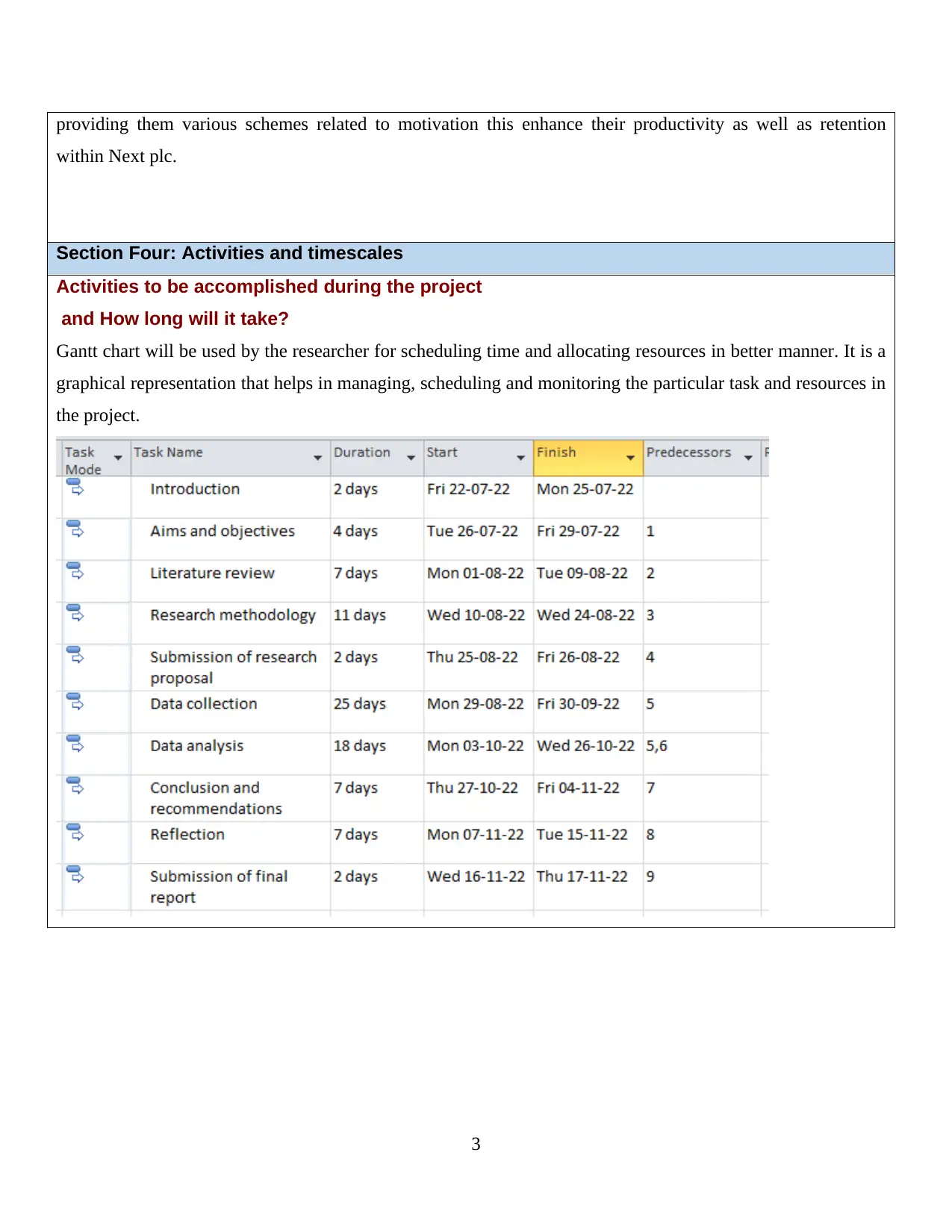
providing them various schemes related to motivation this enhance their productivity as well as retention
within Next plc.
Section Four: Activities and timescales
Activities to be accomplished during the project
and How long will it take?
Gantt chart will be used by the researcher for scheduling time and allocating resources in better manner. It is a
graphical representation that helps in managing, scheduling and monitoring the particular task and resources in
the project.
3
within Next plc.
Section Four: Activities and timescales
Activities to be accomplished during the project
and How long will it take?
Gantt chart will be used by the researcher for scheduling time and allocating resources in better manner. It is a
graphical representation that helps in managing, scheduling and monitoring the particular task and resources in
the project.
3
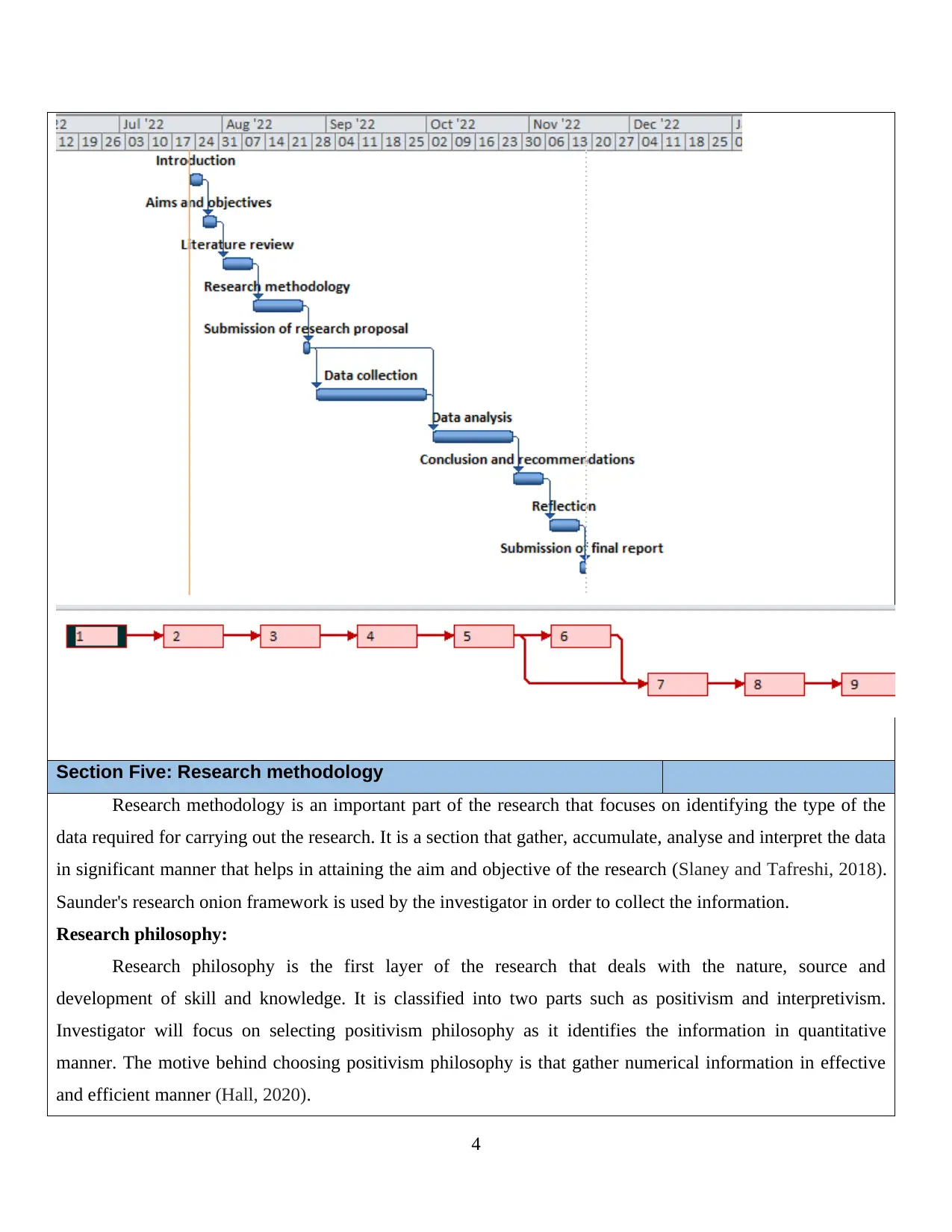
Section Five: Research methodology
Research methodology is an important part of the research that focuses on identifying the type of the
data required for carrying out the research. It is a section that gather, accumulate, analyse and interpret the data
in significant manner that helps in attaining the aim and objective of the research (Slaney and Tafreshi, 2018).
Saunder's research onion framework is used by the investigator in order to collect the information.
Research philosophy:
Research philosophy is the first layer of the research that deals with the nature, source and
development of skill and knowledge. It is classified into two parts such as positivism and interpretivism.
Investigator will focus on selecting positivism philosophy as it identifies the information in quantitative
manner. The motive behind choosing positivism philosophy is that gather numerical information in effective
and efficient manner (Hall, 2020).
4
Research methodology is an important part of the research that focuses on identifying the type of the
data required for carrying out the research. It is a section that gather, accumulate, analyse and interpret the data
in significant manner that helps in attaining the aim and objective of the research (Slaney and Tafreshi, 2018).
Saunder's research onion framework is used by the investigator in order to collect the information.
Research philosophy:
Research philosophy is the first layer of the research that deals with the nature, source and
development of skill and knowledge. It is classified into two parts such as positivism and interpretivism.
Investigator will focus on selecting positivism philosophy as it identifies the information in quantitative
manner. The motive behind choosing positivism philosophy is that gather numerical information in effective
and efficient manner (Hall, 2020).
4
Secure Best Marks with AI Grader
Need help grading? Try our AI Grader for instant feedback on your assignments.
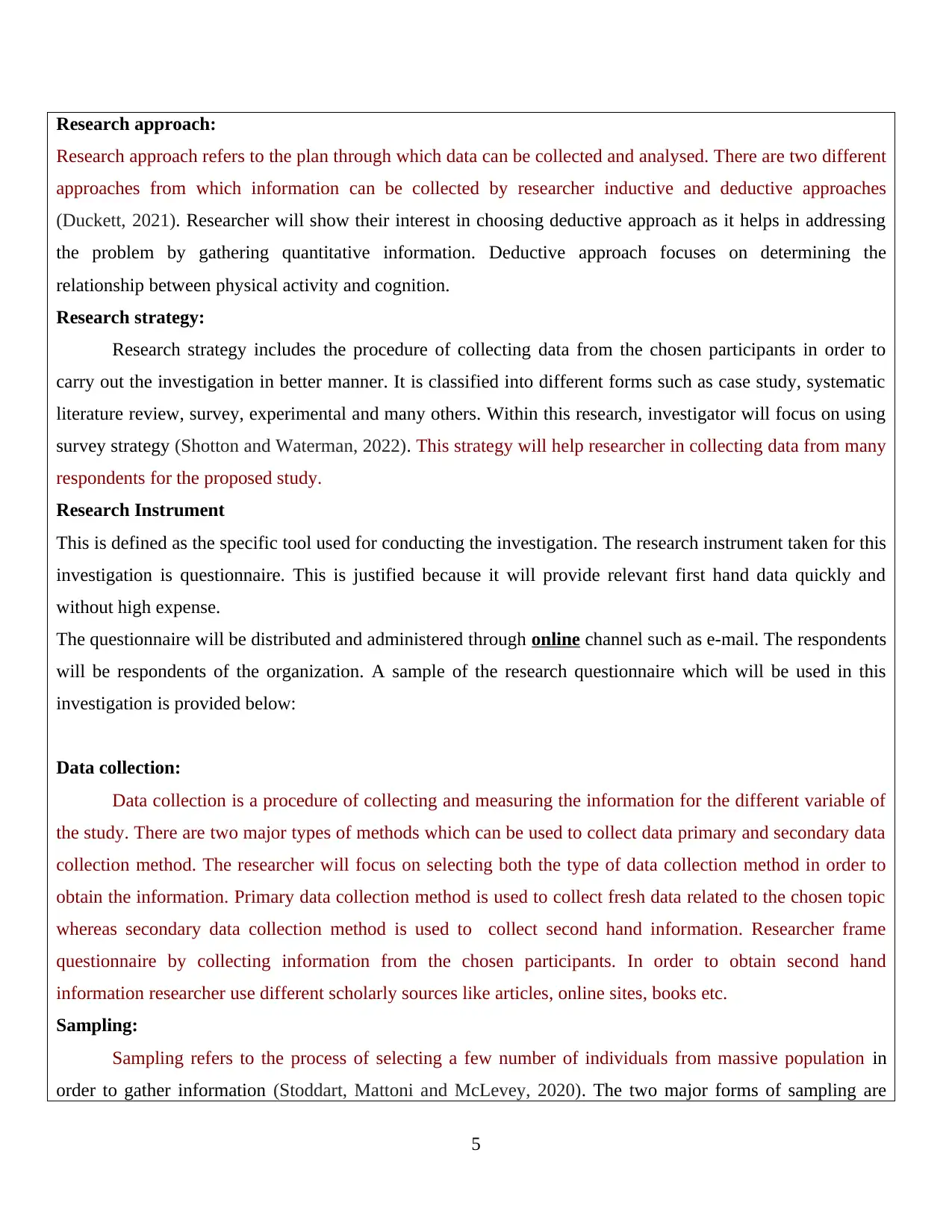
Research approach:
Research approach refers to the plan through which data can be collected and analysed. There are two different
approaches from which information can be collected by researcher inductive and deductive approaches
(Duckett, 2021). Researcher will show their interest in choosing deductive approach as it helps in addressing
the problem by gathering quantitative information. Deductive approach focuses on determining the
relationship between physical activity and cognition.
Research strategy:
Research strategy includes the procedure of collecting data from the chosen participants in order to
carry out the investigation in better manner. It is classified into different forms such as case study, systematic
literature review, survey, experimental and many others. Within this research, investigator will focus on using
survey strategy (Shotton and Waterman, 2022). This strategy will help researcher in collecting data from many
respondents for the proposed study.
Research Instrument
This is defined as the specific tool used for conducting the investigation. The research instrument taken for this
investigation is questionnaire. This is justified because it will provide relevant first hand data quickly and
without high expense.
The questionnaire will be distributed and administered through online channel such as e-mail. The respondents
will be respondents of the organization. A sample of the research questionnaire which will be used in this
investigation is provided below:
Data collection:
Data collection is a procedure of collecting and measuring the information for the different variable of
the study. There are two major types of methods which can be used to collect data primary and secondary data
collection method. The researcher will focus on selecting both the type of data collection method in order to
obtain the information. Primary data collection method is used to collect fresh data related to the chosen topic
whereas secondary data collection method is used to collect second hand information. Researcher frame
questionnaire by collecting information from the chosen participants. In order to obtain second hand
information researcher use different scholarly sources like articles, online sites, books etc.
Sampling:
Sampling refers to the process of selecting a few number of individuals from massive population in
order to gather information (Stoddart, Mattoni and McLevey, 2020). The two major forms of sampling are
5
Research approach refers to the plan through which data can be collected and analysed. There are two different
approaches from which information can be collected by researcher inductive and deductive approaches
(Duckett, 2021). Researcher will show their interest in choosing deductive approach as it helps in addressing
the problem by gathering quantitative information. Deductive approach focuses on determining the
relationship between physical activity and cognition.
Research strategy:
Research strategy includes the procedure of collecting data from the chosen participants in order to
carry out the investigation in better manner. It is classified into different forms such as case study, systematic
literature review, survey, experimental and many others. Within this research, investigator will focus on using
survey strategy (Shotton and Waterman, 2022). This strategy will help researcher in collecting data from many
respondents for the proposed study.
Research Instrument
This is defined as the specific tool used for conducting the investigation. The research instrument taken for this
investigation is questionnaire. This is justified because it will provide relevant first hand data quickly and
without high expense.
The questionnaire will be distributed and administered through online channel such as e-mail. The respondents
will be respondents of the organization. A sample of the research questionnaire which will be used in this
investigation is provided below:
Data collection:
Data collection is a procedure of collecting and measuring the information for the different variable of
the study. There are two major types of methods which can be used to collect data primary and secondary data
collection method. The researcher will focus on selecting both the type of data collection method in order to
obtain the information. Primary data collection method is used to collect fresh data related to the chosen topic
whereas secondary data collection method is used to collect second hand information. Researcher frame
questionnaire by collecting information from the chosen participants. In order to obtain second hand
information researcher use different scholarly sources like articles, online sites, books etc.
Sampling:
Sampling refers to the process of selecting a few number of individuals from massive population in
order to gather information (Stoddart, Mattoni and McLevey, 2020). The two major forms of sampling are
5

probability and non-probability sampling. In this investigation, researcher will focus on choosing probability
sampling as it gives equal opportunity to each respondents to share information. 50 staff of Next plc will be
chosen in order to collect information.
Milestone one:
Milestone one target date (set by tutor):
Milestone two:
Milestone two target date (set by tutor):
Comments and agreement from tutor
Comments (optional):
I confirm that the project is not work which has been or will be submitted for another qualification and
is appropriate.
Agreed by:
Tutor name: Date:
6
sampling as it gives equal opportunity to each respondents to share information. 50 staff of Next plc will be
chosen in order to collect information.
Milestone one:
Milestone one target date (set by tutor):
Milestone two:
Milestone two target date (set by tutor):
Comments and agreement from tutor
Comments (optional):
I confirm that the project is not work which has been or will be submitted for another qualification and
is appropriate.
Agreed by:
Tutor name: Date:
6
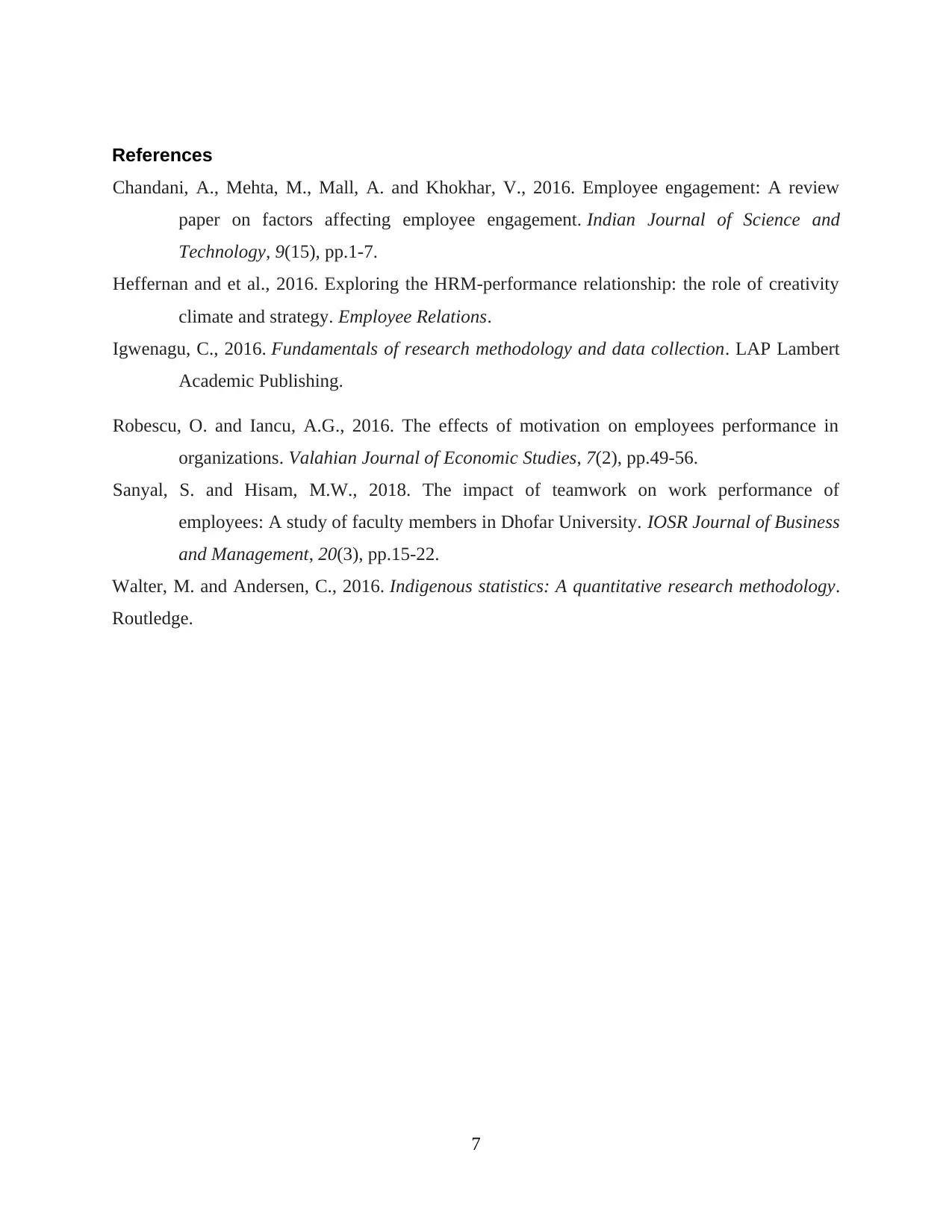
References
Chandani, A., Mehta, M., Mall, A. and Khokhar, V., 2016. Employee engagement: A review
paper on factors affecting employee engagement. Indian Journal of Science and
Technology, 9(15), pp.1-7.
Heffernan and et al., 2016. Exploring the HRM-performance relationship: the role of creativity
climate and strategy. Employee Relations.
Igwenagu, C., 2016. Fundamentals of research methodology and data collection. LAP Lambert
Academic Publishing.
Robescu, O. and Iancu, A.G., 2016. The effects of motivation on employees performance in
organizations. Valahian Journal of Economic Studies, 7(2), pp.49-56.
Sanyal, S. and Hisam, M.W., 2018. The impact of teamwork on work performance of
employees: A study of faculty members in Dhofar University. IOSR Journal of Business
and Management, 20(3), pp.15-22.
Walter, M. and Andersen, C., 2016. Indigenous statistics: A quantitative research methodology.
Routledge.
7
Chandani, A., Mehta, M., Mall, A. and Khokhar, V., 2016. Employee engagement: A review
paper on factors affecting employee engagement. Indian Journal of Science and
Technology, 9(15), pp.1-7.
Heffernan and et al., 2016. Exploring the HRM-performance relationship: the role of creativity
climate and strategy. Employee Relations.
Igwenagu, C., 2016. Fundamentals of research methodology and data collection. LAP Lambert
Academic Publishing.
Robescu, O. and Iancu, A.G., 2016. The effects of motivation on employees performance in
organizations. Valahian Journal of Economic Studies, 7(2), pp.49-56.
Sanyal, S. and Hisam, M.W., 2018. The impact of teamwork on work performance of
employees: A study of faculty members in Dhofar University. IOSR Journal of Business
and Management, 20(3), pp.15-22.
Walter, M. and Andersen, C., 2016. Indigenous statistics: A quantitative research methodology.
Routledge.
7
Paraphrase This Document
Need a fresh take? Get an instant paraphrase of this document with our AI Paraphraser
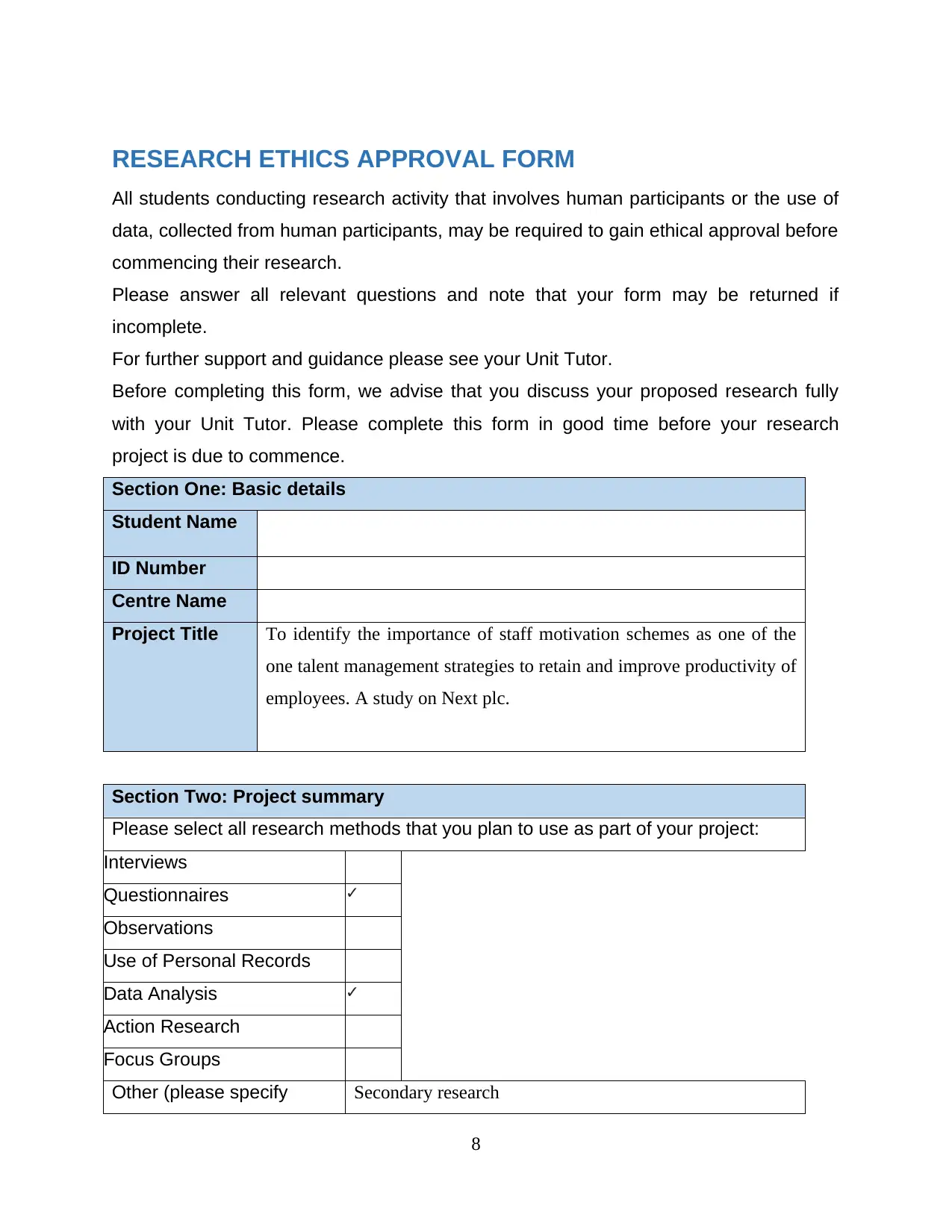
RESEARCH ETHICS APPROVAL FORM
All students conducting research activity that involves human participants or the use of
data, collected from human participants, may be required to gain ethical approval before
commencing their research.
Please answer all relevant questions and note that your form may be returned if
incomplete.
For further support and guidance please see your Unit Tutor.
Before completing this form, we advise that you discuss your proposed research fully
with your Unit Tutor. Please complete this form in good time before your research
project is due to commence.
Section One: Basic details
Student Name
ID Number
Centre Name
Project Title To identify the importance of staff motivation schemes as one of the
one talent management strategies to retain and improve productivity of
employees. A study on Next plc.
Section Two: Project summary
Please select all research methods that you plan to use as part of your project:
Interviews
Questionnaires ✓
Observations
Use of Personal Records
Data Analysis ✓
Action Research
Focus Groups
Other (please specify Secondary research
8
All students conducting research activity that involves human participants or the use of
data, collected from human participants, may be required to gain ethical approval before
commencing their research.
Please answer all relevant questions and note that your form may be returned if
incomplete.
For further support and guidance please see your Unit Tutor.
Before completing this form, we advise that you discuss your proposed research fully
with your Unit Tutor. Please complete this form in good time before your research
project is due to commence.
Section One: Basic details
Student Name
ID Number
Centre Name
Project Title To identify the importance of staff motivation schemes as one of the
one talent management strategies to retain and improve productivity of
employees. A study on Next plc.
Section Two: Project summary
Please select all research methods that you plan to use as part of your project:
Interviews
Questionnaires ✓
Observations
Use of Personal Records
Data Analysis ✓
Action Research
Focus Groups
Other (please specify Secondary research
8
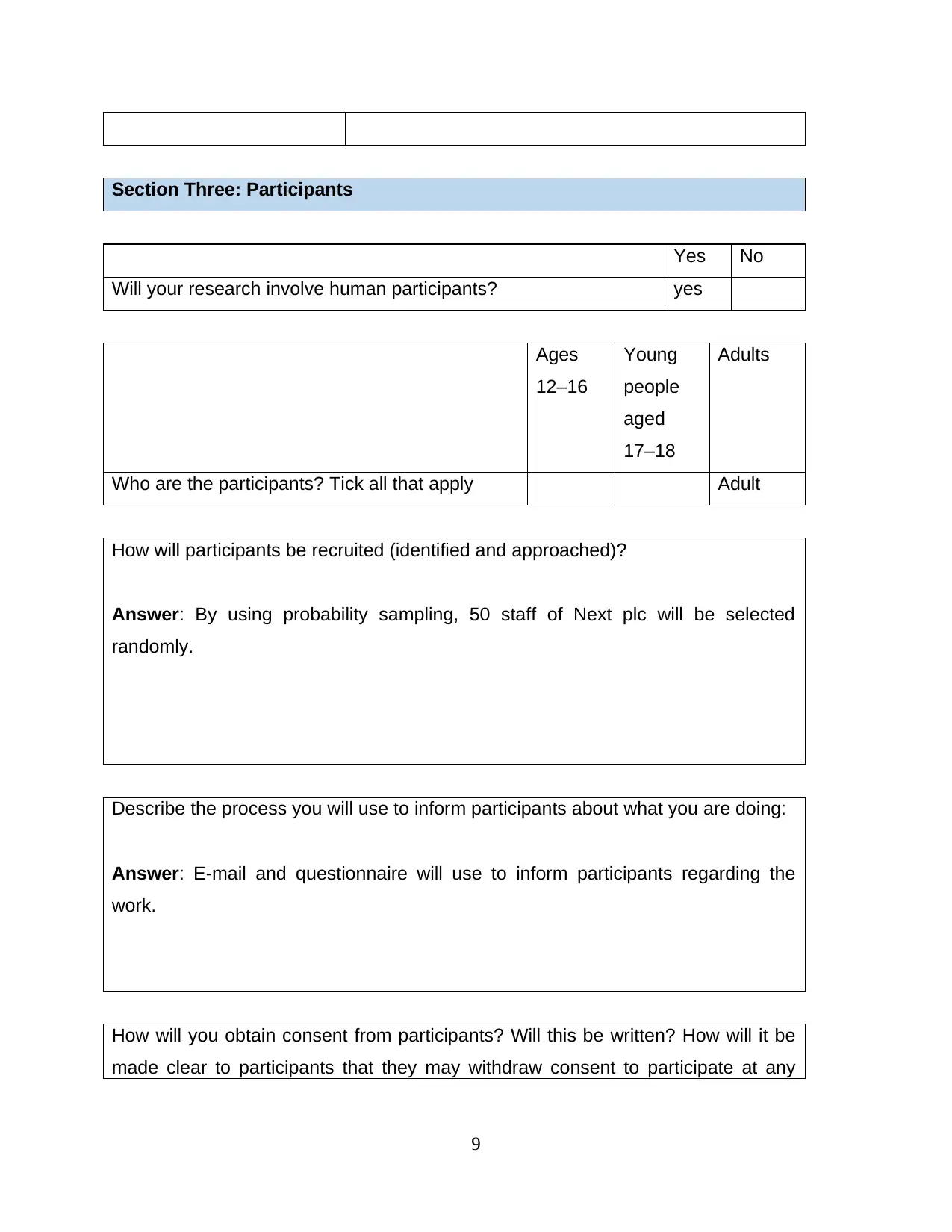
Section Three: Participants
Yes No
Will your research involve human participants? yes
Ages
12–16
Young
people
aged
17–18
Adults
Who are the participants? Tick all that apply Adult
How will participants be recruited (identified and approached)?
Answer: By using probability sampling, 50 staff of Next plc will be selected
randomly.
Describe the process you will use to inform participants about what you are doing:
Answer: E-mail and questionnaire will use to inform participants regarding the
work.
How will you obtain consent from participants? Will this be written? How will it be
made clear to participants that they may withdraw consent to participate at any
9
Yes No
Will your research involve human participants? yes
Ages
12–16
Young
people
aged
17–18
Adults
Who are the participants? Tick all that apply Adult
How will participants be recruited (identified and approached)?
Answer: By using probability sampling, 50 staff of Next plc will be selected
randomly.
Describe the process you will use to inform participants about what you are doing:
Answer: E-mail and questionnaire will use to inform participants regarding the
work.
How will you obtain consent from participants? Will this be written? How will it be
made clear to participants that they may withdraw consent to participate at any
9
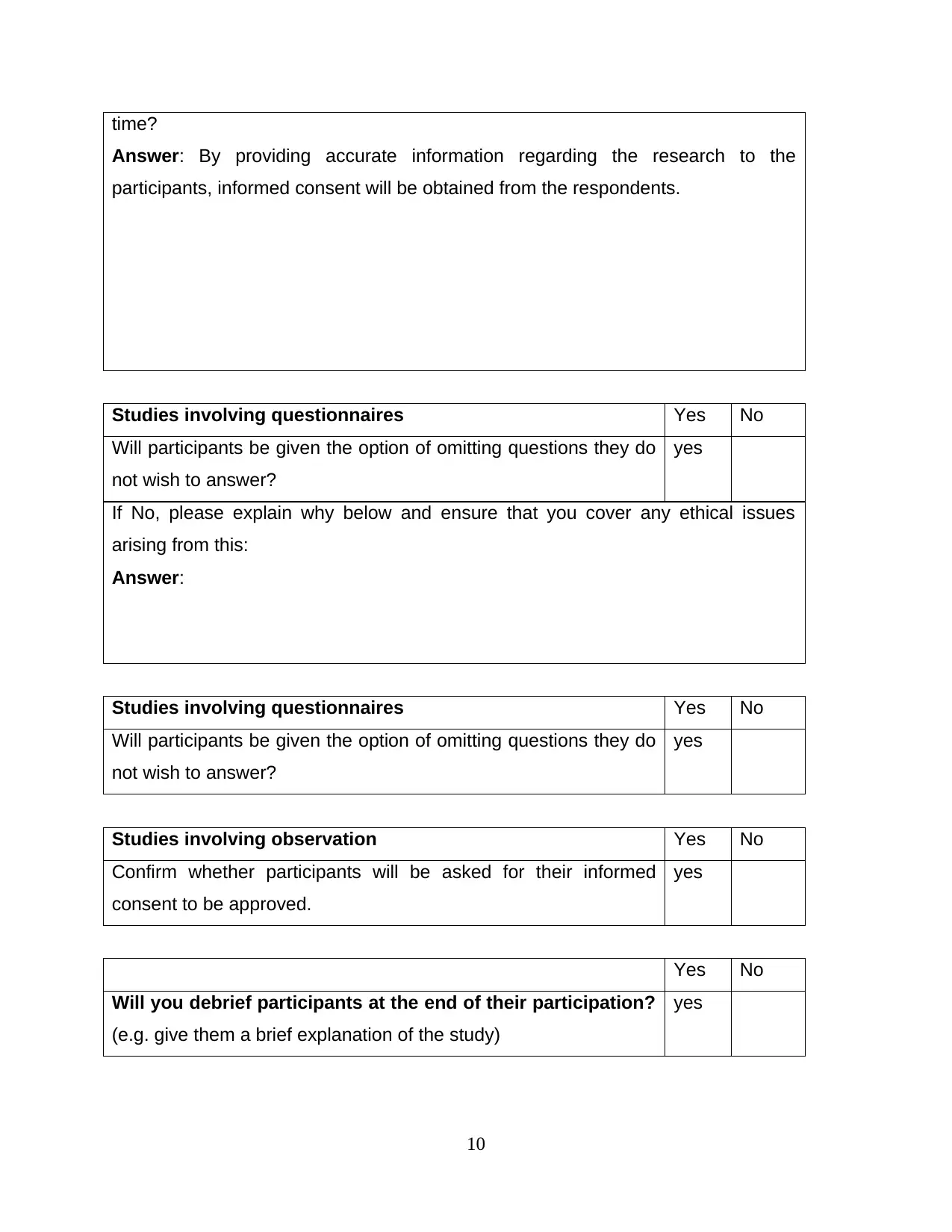
time?
Answer: By providing accurate information regarding the research to the
participants, informed consent will be obtained from the respondents.
Studies involving questionnaires Yes No
Will participants be given the option of omitting questions they do
not wish to answer?
yes
If No, please explain why below and ensure that you cover any ethical issues
arising from this:
Answer:
Studies involving questionnaires Yes No
Will participants be given the option of omitting questions they do
not wish to answer?
yes
Studies involving observation Yes No
Confirm whether participants will be asked for their informed
consent to be approved.
yes
Yes No
Will you debrief participants at the end of their participation?
(e.g. give them a brief explanation of the study)
yes
10
Answer: By providing accurate information regarding the research to the
participants, informed consent will be obtained from the respondents.
Studies involving questionnaires Yes No
Will participants be given the option of omitting questions they do
not wish to answer?
yes
If No, please explain why below and ensure that you cover any ethical issues
arising from this:
Answer:
Studies involving questionnaires Yes No
Will participants be given the option of omitting questions they do
not wish to answer?
yes
Studies involving observation Yes No
Confirm whether participants will be asked for their informed
consent to be approved.
yes
Yes No
Will you debrief participants at the end of their participation?
(e.g. give them a brief explanation of the study)
yes
10
Secure Best Marks with AI Grader
Need help grading? Try our AI Grader for instant feedback on your assignments.
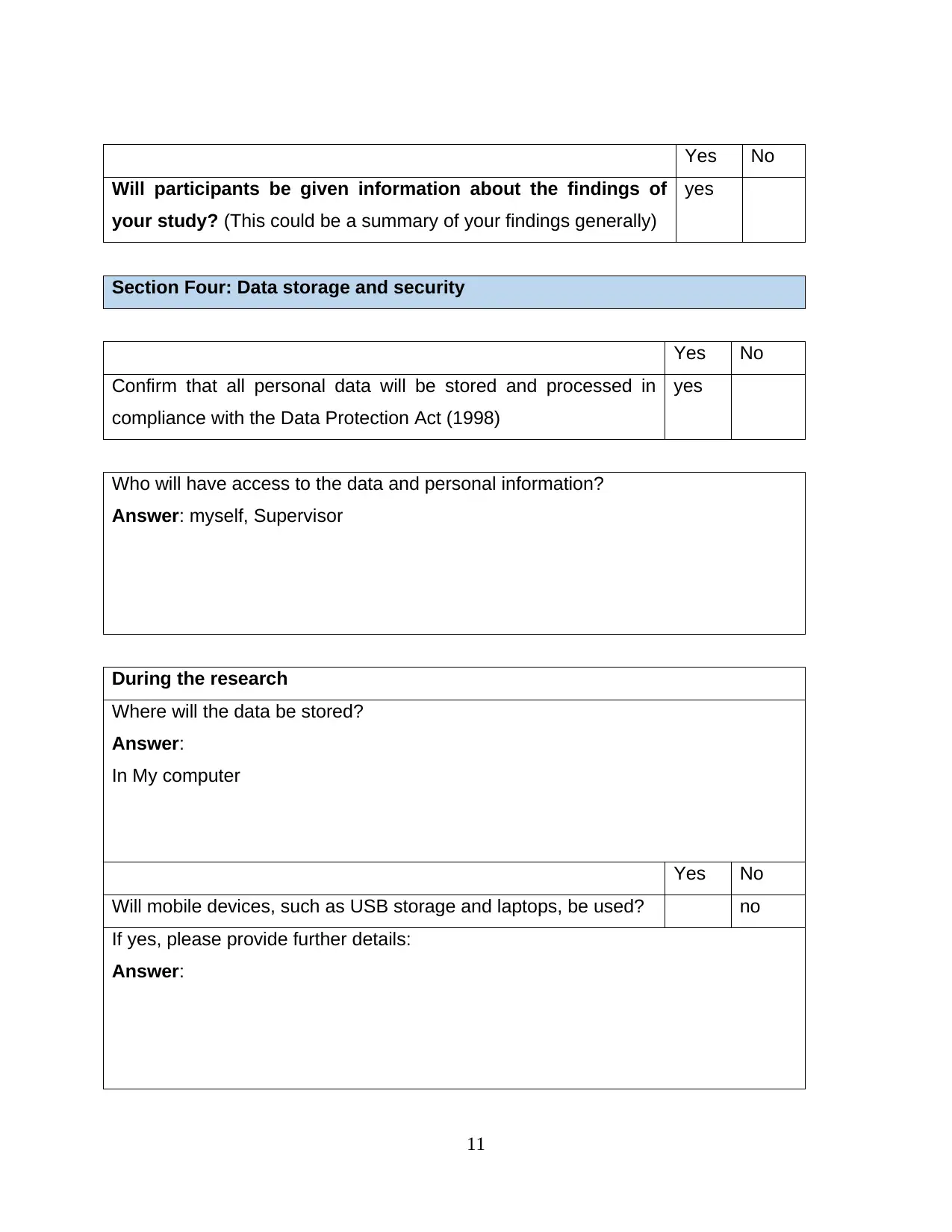
Yes No
Will participants be given information about the findings of
your study? (This could be a summary of your findings generally)
yes
Section Four: Data storage and security
Yes No
Confirm that all personal data will be stored and processed in
compliance with the Data Protection Act (1998)
yes
Who will have access to the data and personal information?
Answer: myself, Supervisor
During the research
Where will the data be stored?
Answer:
In My computer
Yes No
Will mobile devices, such as USB storage and laptops, be used? no
If yes, please provide further details:
Answer:
11
Will participants be given information about the findings of
your study? (This could be a summary of your findings generally)
yes
Section Four: Data storage and security
Yes No
Confirm that all personal data will be stored and processed in
compliance with the Data Protection Act (1998)
yes
Who will have access to the data and personal information?
Answer: myself, Supervisor
During the research
Where will the data be stored?
Answer:
In My computer
Yes No
Will mobile devices, such as USB storage and laptops, be used? no
If yes, please provide further details:
Answer:
11
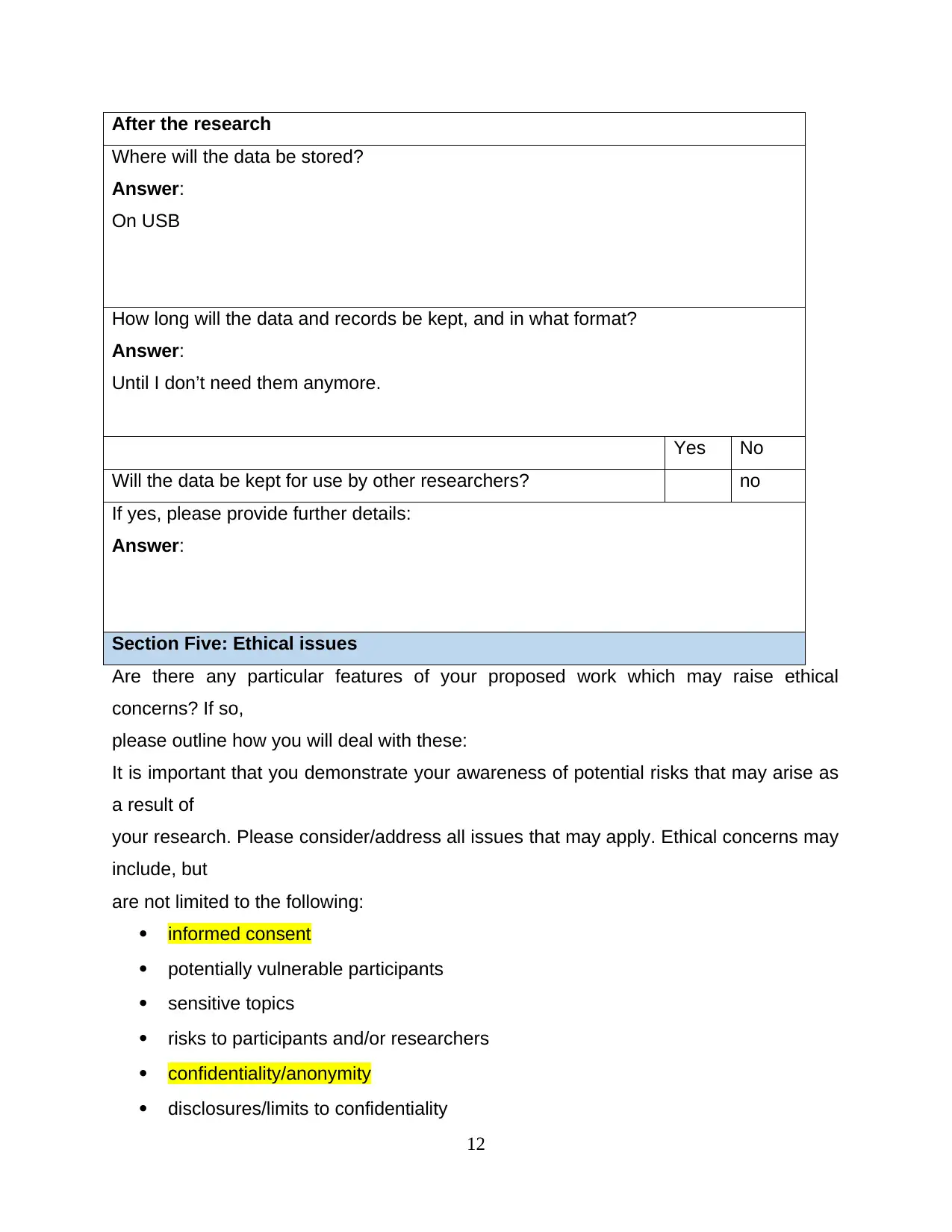
After the research
Where will the data be stored?
Answer:
On USB
How long will the data and records be kept, and in what format?
Answer:
Until I don’t need them anymore.
Yes No
Will the data be kept for use by other researchers? no
If yes, please provide further details:
Answer:
Section Five: Ethical issues
Are there any particular features of your proposed work which may raise ethical
concerns? If so,
please outline how you will deal with these:
It is important that you demonstrate your awareness of potential risks that may arise as
a result of
your research. Please consider/address all issues that may apply. Ethical concerns may
include, but
are not limited to the following:
informed consent
potentially vulnerable participants
sensitive topics
risks to participants and/or researchers
confidentiality/anonymity
disclosures/limits to confidentiality
12
Where will the data be stored?
Answer:
On USB
How long will the data and records be kept, and in what format?
Answer:
Until I don’t need them anymore.
Yes No
Will the data be kept for use by other researchers? no
If yes, please provide further details:
Answer:
Section Five: Ethical issues
Are there any particular features of your proposed work which may raise ethical
concerns? If so,
please outline how you will deal with these:
It is important that you demonstrate your awareness of potential risks that may arise as
a result of
your research. Please consider/address all issues that may apply. Ethical concerns may
include, but
are not limited to the following:
informed consent
potentially vulnerable participants
sensitive topics
risks to participants and/or researchers
confidentiality/anonymity
disclosures/limits to confidentiality
12
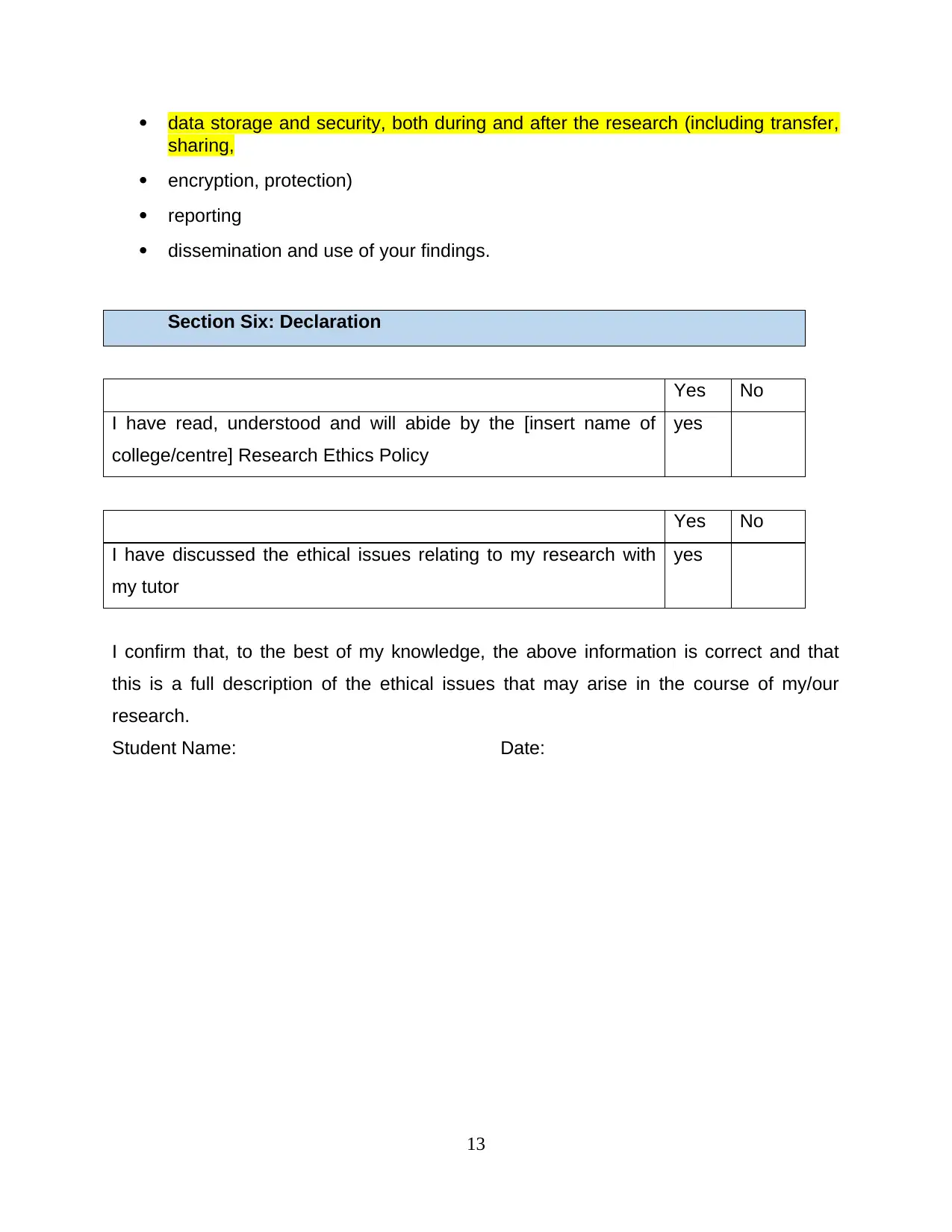
data storage and security, both during and after the research (including transfer,
sharing,
encryption, protection)
reporting
dissemination and use of your findings.
Section Six: Declaration
Yes No
I have read, understood and will abide by the [insert name of
college/centre] Research Ethics Policy
yes
Yes No
I have discussed the ethical issues relating to my research with
my tutor
yes
I confirm that, to the best of my knowledge, the above information is correct and that
this is a full description of the ethical issues that may arise in the course of my/our
research.
Student Name: Date:
13
sharing,
encryption, protection)
reporting
dissemination and use of your findings.
Section Six: Declaration
Yes No
I have read, understood and will abide by the [insert name of
college/centre] Research Ethics Policy
yes
Yes No
I have discussed the ethical issues relating to my research with
my tutor
yes
I confirm that, to the best of my knowledge, the above information is correct and that
this is a full description of the ethical issues that may arise in the course of my/our
research.
Student Name: Date:
13
1 out of 13
Related Documents
Your All-in-One AI-Powered Toolkit for Academic Success.
+13062052269
info@desklib.com
Available 24*7 on WhatsApp / Email
![[object Object]](/_next/static/media/star-bottom.7253800d.svg)
Unlock your academic potential
© 2024 | Zucol Services PVT LTD | All rights reserved.



